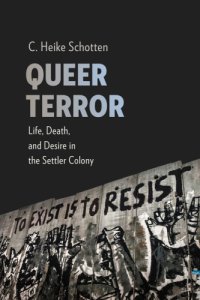
Ebook: Queer Terror: Life, Death, and Desire in the Settler Colony
Author: C. Heike Schotten
- Tags: American Imperialism, racism, militarism, queer theory, decolonization, neo-colonialism, critical theory, anti-war, anti-racist, imperialism, us and them, divide and rule
- Series: New Directions in Critical Theory
- Year: 2018
- Publisher: Columbia University Press
- Language: English
- epub
After Sept. 11, 2001, George W. Bush declared, “Either you are with us, or you are with the terrorists.” Bush’s assertion was not simply jingoist bravado―it encapsulates the civilizationalist moralism that has motivated and defined the United States since its beginning, linking the War on Terror to the nation’s settlement and founding.
In Queer Terror, C. Heike Schotten offers a critique of U.S. settler-colonial empire that draws on political, queer, and critical indigenous theory to situate Bush’s either/or moralism and reframe the concept of terrorism. The categories of the War on Terror exemplify the moralizing politics that insulate U.S. empire from critique, render its victims deserving of its abuses, and delegitimize resistance to it as unthinkable and perverse. Schotten provides an anatomy of this moralism, arguing for a new interpretation of biopolitics that is focused on sovereignty and desire rather than racism and biology. This rethinking of biopolitics puts critical political theory of empire in dialogue with the insights of both native studies and queer theory. Building on queer theory’s refusal of sanctity, propriety, and moralisms of all sorts, Schotten ultimately contends that the answer to Bush’s ultimatum is clear: dissidents must reject the false choice he presents and stand decisively against “us,” rejecting its moralism and the sanctity of its “life,” in order to further a truly emancipatory, decolonizing queer politics.
C. Heike Schotten is associate professor of political science at the University of Massachusetts Boston. She is the author of Nietzsche’s Revolution: Décadence, Politics, and Sexuality (2009).
In Queer Terror, C. Heike Schotten offers a critique of U.S. settler-colonial empire that draws on political, queer, and critical indigenous theory to situate Bush’s either/or moralism and reframe the concept of terrorism. The categories of the War on Terror exemplify the moralizing politics that insulate U.S. empire from critique, render its victims deserving of its abuses, and delegitimize resistance to it as unthinkable and perverse. Schotten provides an anatomy of this moralism, arguing for a new interpretation of biopolitics that is focused on sovereignty and desire rather than racism and biology. This rethinking of biopolitics puts critical political theory of empire in dialogue with the insights of both native studies and queer theory. Building on queer theory’s refusal of sanctity, propriety, and moralisms of all sorts, Schotten ultimately contends that the answer to Bush’s ultimatum is clear: dissidents must reject the false choice he presents and stand decisively against “us,” rejecting its moralism and the sanctity of its “life,” in order to further a truly emancipatory, decolonizing queer politics.
C. Heike Schotten is associate professor of political science at the University of Massachusetts Boston. She is the author of Nietzsche’s Revolution: Décadence, Politics, and Sexuality (2009).
Download the book Queer Terror: Life, Death, and Desire in the Settler Colony for free or read online
Continue reading on any device:

Last viewed books
Related books
{related-news}
Comments (0)